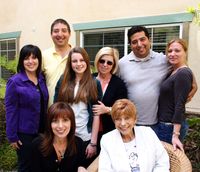 My brother Tod wrote a piece for the Wall Street Journal today about what it's like being part of a family of writers…and the dymanics that have shaped us into the authors were are today. He says, in part:
My brother Tod wrote a piece for the Wall Street Journal today about what it's like being part of a family of writers…and the dymanics that have shaped us into the authors were are today. He says, in part:
the truth is that I didn’t really grow up surrounded by writers as much as all the people I grew up with – my older brother, Lee Goldberg, and my two older sisters, Karen Dinino and Linda Woods, who often collaborate – all became authors. We are separated by nine years, oldest to youngest, yet we managed to end up in the same place, at least metaphorically speaking.
My brother was first. His debut novel, .357 Vigilante, a slim men’s action adventure written under the absurd pen-name Ian Ludlow, was released in 1985 after he got a book deal through his writing teacher at UCLA. I would follow fifteen years later with my first novel and then my sisters, writing as a team, published their first book in 2006. Combined, we’ve published 50 books, hundreds of short stories, essays and features and, in my brother Lee’s case, written or produced 26 different television shows.
[…]We had a difficult childhood, all of us: our mother was dying for most of our lives, the victim of both lupus and cancer, though she’d actually live for 73 years, but that specter hung over us, along with her propensity towards madness. And our father was simply gone, long before he was actually gone. We each escaped into words from an early age. That’s the sad truth that lives under the happy result. The “how” is easily revealed: we enjoyed the escape so much that it became our physical world.
For more, check out the article. You'll know more about us afterwards than you'd ever want to.
(Pictured: l-r Linda Woods, Lee Goldberg, Maddie Goldberg, Valerie Goldberg, Tod Goldberg, Wendy Goldberg, Karen Dinino, and Jan Curran)

It’s very good of Tod and you and your sisters to share this humanity. It’s a theory in literature that writers develop out of a personal life of suffering. Homer was blind. Milton dictated “Paradise Lost” after he went blind. Hemingway, and an entire generation suffered from WWI, and yet found a way to transcend it.
Shakespeare got a woman pregnant who was six years older and she was very probably unfaithful to him. Suffering is the price an artist pays for depth of insight. Plato, for example, only set out to discover the principles for good government after he was horrified by the condemming to death of his mentor Socrates.
It is the effort, the determination, to NOT be a victim, to make something GREAT out of one’s life, no matter what, to contribute one’s learnings to the next generation and more, that continues to raise this thing called “Western Culture” to new heights, that makes all the pain worth while, that gets us progressing to higher understandings that do away with the pain and suffering.
I sure will.
I already know to much………..but love you guys anyway….!!
That was a great piece, Lee. Very moving. I found much there to identify with myself, and I am not the only writer in my family, either–I suppose you can say I am the second generation (my aunt was the first and even my father tried his hand before deciding he liked science and math better and became an engineer). I hope you or Todd post some of the responses your family gives to supply the humor that was lacking as the piece really needed a laugh to lighten the seriousness of the tone. I’m going over to Todd’s site next to tell him he did a good job. Thanks for posting this.